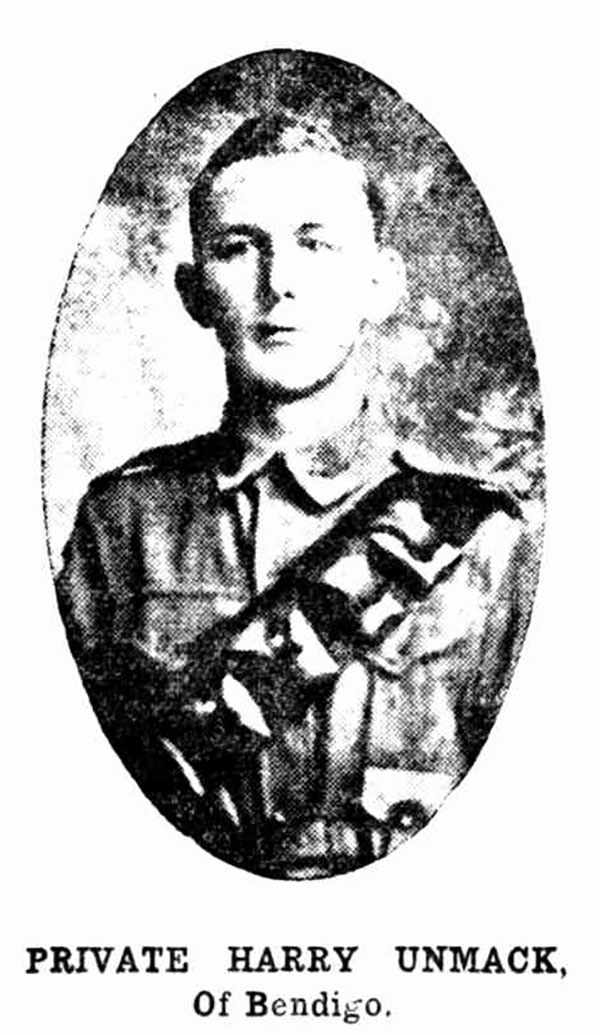DOCUMENTARY |
GUMLEAF GERMANS |
ENLISTEES |
Harry Julius Frederick Unmack

Harry Julius Frederick Unmack. Photo: Bendigo
Advertiser.Harry Julius Frederick Unmack (1896-1974) was born at Bendigo on 24 September 1896, He was the son of Charles and Lily (née Fry) Unmack, of Bendigo, who married in 1890.
Harry’s grandfather, Carl Unmack, arrived in Australia aboard the Peter Godeffroy in December 1852 with a cousin who was also named Carl Unmack. He emigrated from Neu Buckow in Mecklenburg, the same village as the Ziebell family and others living at Westgarthtown. On March 1856, Carl married Wilhelmine Westphal, who had arrived in Australia on the Helene only two months earlier, suggesting they knew each other in Germany. Wilhelmine was accompanied to Australia by Christian Ziebell on his return from a visit back to Mecklenburg. Although Carl and Wilhelmine gave their address as Westgarthtown at the time of their marriage, their usual address was Bendigo, where he had been a gold miner since 1854. Both were 26.
After gold mining and cattle dealing, Carl established a butchery business in Bendigo in 1876 in partnership with son-in-law Bernhard Sprenger, who married his eldest daughter, Fredericke. When Carl died in 1902 aged 71, he left seven children. Wilhelmine died in 1909. Both are buried in the Bendigo Cemetery. Harry’s father Charles and his uncle Alfred continued the butchery partnership. Charles, who died in 1917, had a sister Sophia who married Charles Ziebell, the Fitzroy chemist, who was a grandson of Christian and Sophia Ziebell.
Harry enlisted at Bendigo on 7 December 1914. A process engraver employed by the Melbourne firm of Webb & Co., he was 18, but gave his age as 19. His religion was Church of England. Harry, who had previously served with the Senior Cadets, Citizen Forces was allocated to the 3rd Reinforcements, 4th Light Horse Regiment, Private, No. 816 and embarked for Egypt aboard the Katuna on 3 February 1915.
After training in Egypt, Harry joined the 4th Light Horse Regiment at Gallipoli on 5 August 1915. On 21 September 1915 he was transferred to the 4th Machine Gun Squadron. Three days later he wrote to his father saying it was 'very interesting work'. In the same letter he wrote that the trenches were full of lice and he had to remove them from his clothes twice a day, catching 'about 20 or 30 each time.' He also said it was so cold he 'could barely write this letter'.
Harry also asked his father 'how are things going with you at the shop? Do you think you will be able to hang on? I hope you can!' This query presumably related to anti-German sentiment which badly affected the business of many German-Australian traders during the war.
Harry was admitted to hospital on 10 November and evacuated from Gallipoli to Egypt and admitted to No. 15, General Hospital at Alexandria on 15 November with neurasthenia. He was transferred to No. 1, Australian General Hospital at Heliopolis on 21 December 1915 with concussion of the spine and the following day moved to the 1st Australian Convalescent Depot.
Harry wrote back to Australia from Alexandria advising of his wounds. He:
‘conveyed the news that he had been blown up in a trench by a shell and was now in hospital…his back and side received the effects of the bursting shell…he expects to be in hospital for some time, and probably will be invalided home…he had experienced a couple of remarkable escapes from death. On one occasion he was carrying a box of ammunition on his shoulder, and it was blown off, while on another day he had only left a sap a few seconds when it was blown clean out.’
Harry was invalided to Australia aboard the Karoola which left Suez on 20 January and arrived back on 21 February 1916. Although he was sent home ‘for six months change’, he was discharged as medically unfit from the AIF on 14 May 1916. He was awarded a war pension of £3 per fortnight from 15 May, reduced to £2 from 25 October 1917.
Harry’s sister Sophie’s husband, Lieutenant George Mills, also served during World War 1, with the 38th Battalion.
On 27 April 1918 aged 22, Harry enlisted at Queanbeyan for home service and was allocated to the Molongo Defence Guard. His occupation was given as process engraver. He served until 16 January 1919 when he was discharged at his own request.
After his father’s death, Harry’s mother moved to North Sydney. Harry was living at Forbes in 1923 and Eugowra in 1924, then in 1926 he married Constance Sybil Husband at North Sydney and they had two children. They had moved to Melbourne by 1931 where he worked as a process engraver. In his later years he lived at Beaumaris. He died at the Repatriation Hospital, Heidelberg on 15 January 1972 aged 75. His wife had predeceased him in 1968 and both were cremated at Springvale. Harry is commemorated in the Victorian Garden of Remembrance at Springvale.
